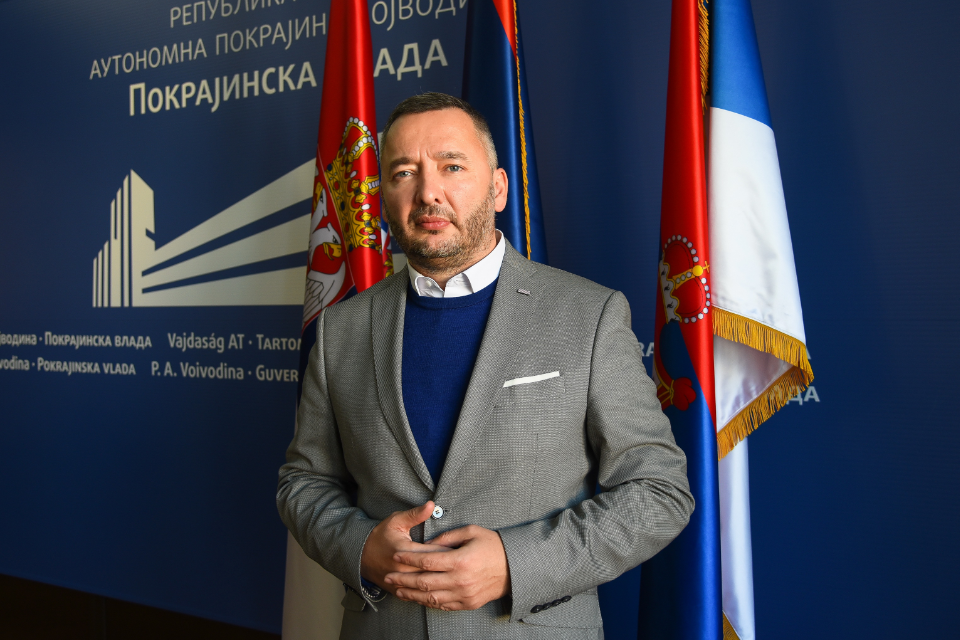Take Five: “Continuous education changes the attitudes and awareness of all professionals in the system, in order to achieve zero tolerance to violence”
Date:

Professionals from institutions that deal with violence against women in the Autonomous province of Vojvodina in Serbia are now more sensitized to work with women survivors of violence, especially those from marginalized groups. Their knowledge, education and awareness have also increased as a result of a fruitful partnership between UN Women Serbia and the Provincial Secretariat for Social Policy, Demography and Gender Equality. Predrag Vuletić, Provincial Secretary for Social Policy, Demography and Gender Equality spoke to UN Women about the visible effects of the "Integrated Response to Violence against Women and Girls in Serbia, Phase 2" project for institutions at the local and provincial level. He also introduced the initiatives in Phase 3, which started in October 2021 and will last until September 2022.
How did the implementation of the project affect the system of protection and support for victims of violence against women and domestic violence in Vojvodina?
Professionals in all systems in charge of treatment (social protection, judiciary, police, health, education) are sensitized to work with vulnerable groups of women and deal with cases of sexual violence. The fact that many professionals from different institutions were included, who passed the same programme and acquired the same knowledge, contributed to the harmonization of their knowledge and skills development. This has enabled more efficient cooperation, which will allow for better work on cases.
How do you assess progress in the cooperation of institutions at the provincial and local level?
Thanks to the cooperation with UN Women, we have managed to interconnect all of the institutions that are involved in the system of protection and support to victims of gender-based violence and domestic violence. Continuous education changes the attitudes and awareness of all professionals in the system, which is necessary in order to achieve zero tolerance to violence. Cooperation in some segments still depends on individuals and personal contacts, primarily at the local level. It is therefore important that provincial-level institutions set an example and are guided by the highest standards of cooperation in providing integrated responses to violence against women and girls.
How did the coronavirus pandemic affect the work of institutions dealing with violence against women in Vojvodina?
All institutions were ready to work under difficult conditions, in accordance with the recommendations of the national Government. This meant that different working methods were implemented, and citizens were informed through local media about all changes. According to the records available to this Secretariat, there has been no increase in violence during the pandemic, at least not when it comes to reports received by institutions.
What are the key changes that need to be made in society and the system to reduce tolerance to violence and make women and girls safer, in Vojvodina and Serbia?
Social changes can be achieved by building non-stereotypical attitudes from the earliest age, by developing tolerance and respect, because in that way the system changes and that change is permanent and sustainable. One way to achieve this is through education systems, both formal and informal. Formal education must include programmes to increase awareness from an early age. On the other hand, the current system lacks programmes for perpetrators, which would complement the victim protection and support system and reduce recidivism.
What are the planned activities and expected results within the third phase of the project?
We consider the continuation of work at the local level to be very important, because citizens exercise most of their rights at local level. Ten new municipalities have been selected in which licensed training will be conducted and multisectoral cooperation will be improved by applying case conferences to contribute to the creation of a stable system. With this, three quarters of the territory of Vojvodina will be supported and the level of knowledge and sensitivity towards marginalized women and specific forms of violence will be increased. We will support the development of local action plans for the prevention of violence. Provincial institutions will develop a new strategic framework for prevention and protection from gender-based violence against women and girls, which will be based on previous experiences and in accordance with the recommendations of domestic and international bodies, but will also correlate with the strategic framework at the national level.